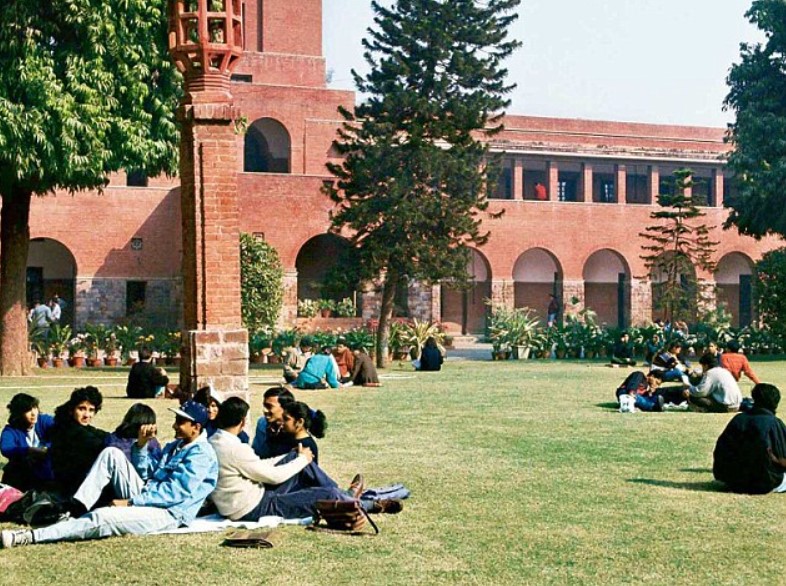
You are busy navigating the borders of language and culture right now, you are trying your best to settle in, the magnanimity and the monstrosity of Delhi awe you. You watch the amaltas sway in rain, the amaltas that has defined Delhi for you in poetry. As the gutter and the potholes fill up, you wonder how different it is from your small home town. You and your Tamilian roommate bond over the rain with bouts of homesickness. Madurai looks more beautiful when it rains, she says. She indirectly tells you she misses home, she talks about her dog, her grandpa, rasam rice and a host of Tamilian terms that express emotions that sound strange in Delhi. You chime in or at least you try to. You and your roommate are but two among the thousands transitioning to college life, moving out of homes, settling in completely strange cities, adapting to new languages, cultures, food while nostalgia hits once in a while. And amidst this constant flux, you take these classrooms, tea breaks, library sessions, aimless loitering on the streets with one on one interactions with the new friends you have made very granted. A year from now, the world perhaps would pause for quite a while and interactions would be wound up only to be enjoyed through google meet, zoom, and discord where you are permitted only square rectangular boxes of your loved ones.
A year from now, libraries would be confined to Jstor, Nlist and others of their ilk; no chairs, no tables, no long hours of ideating with stacks of books around. Despite being enrolled in Delhi University, when your course will talk about the Delhi Sultanate and the Mughals and will take you through the subtleties of power and authority and how well they have been articulated on the canvas that is Delhi, you will google Qutb Minar, Shahjahanabad, Alai Darwaza, you will google the intricacies etched on these monuments and wonder how you ought to have lived among them.
A year from now you will sit by the window of your home and feel cloistered, the only freedom you will have is to buy necessities and even then you will dread stepping out. A year from now you will wonder whether pangs of homesickness was a small price to pay for your freedom.
While a year from now you would be lamenting about losing your prime years locked up inside your home, a few months later the world would seem to completely fall apart, till then you would be wondering when and if at all college would reopen before graduation.

But a year and a half later you will be anxious if at all you would survive. You will watch Delhi—on the television—engulfed by fire, the cremation fire, streets swamped with corpses and families deprived of primary caregivers. You would sit numb wondering if you live to see a healed world and return to Delhi, how many broken homes would greet you. Grief- a year and a half from now, the country would be shrouded in grief, of losing loved ones, of losing the right to one last glimpse, of one last goodbye, of one last try to provide relief as loved ones gasp for breath. You will sit through hours of news that tell you how babies have lost both their parents and now need breast milk to keep them alive, news that tell you the junior you had in college took his last breath a few hours ago, you will sit in denial as you hear your relative who was twenty five years passed away and his parents will too two days later. You will sit quietly as your mother tells you, the grandpa next door who brought you salted peanuts when you were a toddler gasped for breath and his family could not arrange an oxygen cylinder, his wife will die a day later and so will his grandson while the family begged for beds and oxygen. You will blame the government and you will watch them shift the blame to someone else. You will see helpless people calling authorities, begging, crying to save their loved ones. You will see the apathy of men in power. You will see how in a second people will lose everything they had, you will see the flame of hope flicker and slowly die. You will wonder what is the meaning of the scores of assignments that college asks you to submit when students and teachers alike have lost loved ones or are fighting for their lives. You will question the lack of empathy of the authorities that ask students to prepare for semester exams.
A year and a half from now the world will lose some of its charms, hope will be rare, mental peace an illusion. So go out now and take in the smell of wet earth while you still can without a mask, sit with friends on the college lawns, tell them how much you value them because this very well might be the last time you see some of them, tell them how much you treasure the morning teas and coffee breaks, pet that dog that comes to for snuggles, acknowledge the beauty of Delhi and the subtle ways it is growing on you, through your bengali that you now speak with a spattering of Hindi, the Chole Bhature that seem to like for dinner, the trips you plan to Jama Masjid. Flout that seven thirty curfew and go to India Gate at night with your friends, live a little before the world doesn’t let you anymore.When you return home for your mid semester break, smile at the newspaper boy, tell him that he does a great job because a year from now he won’t be even thirty and yet he will breathe his last. Tell the laundry man how well he takes care of your clothes , tell him you are grateful because a year from now he will die after two days of fever unattended at his home. Please tell people that you love them and that you will miss them before the world snatches away the opportunity from you. And when you vote for the first time, remember the promises they make because a year later when hospital beds would fall short , all the promised temples would stand tall. Communalism would win as human lives are lost. You sure miss home now but a year and a half later, cloistered in your room the proverb: “Hunuz Dilli Dur Ast” would ring loud and true. While you are worrying about grades and colleges, the future is not in your hands and won’t be according to your planned schedule, so live life while you still have it.
Anushka is currently pursuing her Bachelor's degree in History from St. Stephen's College. To weave stories of the past and strike it's relevance in present times and the times to come is her hobby.


